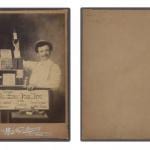 We saw Tropical Storm Harvey coming in Houston, knew that something bad was coming, but could do little. The tempest was coming, mostly too late to change the path we had trod when sitting in the path of the wrath of gods.
We saw Tropical Storm Harvey coming in Houston, knew that something bad was coming, but could do little. The tempest was coming, mostly too late to change the path we had trod when sitting in the path of the wrath of gods.
Houston had to accept what could not be denied. We also had the choice to act with courage and be strong in the storm. We (mostly) did and were.
Just now we face a metaphorical storm as a church, confusing and dangerous times are upon us. If this is always so, we are in a year where the storm is more obvious to us. The winds of our age blow against the ark of salvation, God’s church. We hope, we have faith, that there is a plan and the ending can be happy.
Is there some magic that will fix it all?
There is not, at least not in human hands. The storm is, after all, the result of previous decisions we have made. We chose to build our city here, in this way, at this time. At the end of his career as the greatest writer in English, William Shakespeare wrote The Tempest. He lived in times where the moral dilemmas of a “new world” faced an England, hardly recovered from fratricidal wars for the scepter on that isle.
As a genius is want to do, Shakespeare thought, wrote, and left us wisdom for his time and all such times. If you have not read or watched the play The Tempest, do so, though you might avoid the BBC 1980 version.
The political order is a mess at the start of the play: opportunists have seized power. The first time we hear from politicians they are shouting about hanging. The fate of all seems controlled by the magician, Prospero, but like the scientists of our time, fate and fortune limit what he can do. Fortune brings opportunity where he can use the magic of book learning to control some outcomes. He is, however, weary and will soon return home.
The play itself is a discussion of the deeper enchanters in any community: the artists who entertain and educate us. The great magic is the talent of the poet, Shakespeare, to conjure this world for us. He makes the small stage a magical island surrounded by a wild sea. His script drives the characters forward to their fates. At every turn, however, Shakespeare points to a Divine Providence greater than the author or his script.
There is a divine truth that will survive any storm, conjured or natural. The artist can tell any tell, create any beast or fairy, but does so within the created cosmos of Providence.
In the end, an Epilogue has Prospero, standing in for Shakespeare, ask for our prayers to set him free. The character Prospero has given up trying to control the world by magic. The political order is (mostly) healed and the old magician is heading back to his homeland where he belongs. The aging Shakespeare also is headed back to Stratford to enjoy the fruit of his years of toil. Created in the image of God, the children of God, much can be done by our rough magics: scientific and artistic. To the young lovers this is a brave new world, but this old world is only new to those who are young: the old like Prospero in the play and Shakespeare the author know better.
The conjuring is tiring. The time comes to go home, to be released by prayer to liberty.
Only divine Providence, beyond fate and fortune, can give our life meaning.
From a devotional for a High Table at The College at The Saint Constantine School.












